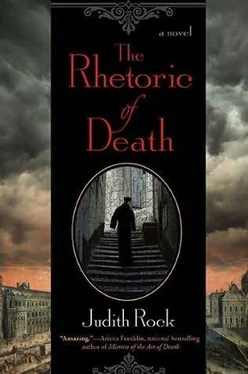Judith Rock - The Rhetoric of Death
Здесь есть возможность читать онлайн «Judith Rock - The Rhetoric of Death» весь текст электронной книги совершенно бесплатно (целиком полную версию без сокращений). В некоторых случаях можно слушать аудио, скачать через торрент в формате fb2 и присутствует краткое содержание. Жанр: Исторический детектив, на английском языке. Описание произведения, (предисловие) а так же отзывы посетителей доступны на портале библиотеки ЛибКат.
- Название:The Rhetoric of Death
- Автор:
- Жанр:
- Год:неизвестен
- ISBN:нет данных
- Рейтинг книги:3 / 5. Голосов: 1
-
Избранное:Добавить в избранное
- Отзывы:
-
Ваша оценка:
- 60
- 1
- 2
- 3
- 4
- 5
The Rhetoric of Death: краткое содержание, описание и аннотация
Предлагаем к чтению аннотацию, описание, краткое содержание или предисловие (зависит от того, что написал сам автор книги «The Rhetoric of Death»). Если вы не нашли необходимую информацию о книге — напишите в комментариях, мы постараемся отыскать её.
The Rhetoric of Death — читать онлайн бесплатно полную книгу (весь текст) целиком
Ниже представлен текст книги, разбитый по страницам. Система сохранения места последней прочитанной страницы, позволяет с удобством читать онлайн бесплатно книгу «The Rhetoric of Death», без необходимости каждый раз заново искать на чём Вы остановились. Поставьте закладку, и сможете в любой момент перейти на страницу, на которой закончили чтение.
Интервал:
Закладка:
Charles went to the lectern and the students rose. As one, they swept off their hats and executed a beautiful ensemble bow. Charles gave them a lesser bow, as his age and ecclesiastical status dictated, though he was sorry he had no hat to flourish, skullcaps being socially useless. The boys ceremoniously replaced their hats and resumed their seats. Once seated, though, they surprised Charles by plucking the old hats off again and stuffing them under the benches.
“I thank you for your most courteous welcome, messieurs,” he said, smiling at them. “I am lately come from the Society’s college at Carpentras, where I taught rhetoric and produced ballets and plays. I am most honored to be at Louis le Grand and I trust that our association will be both a pleasant and a profitable one. I know that Pere Jouvancy holds you to the highest standard, in the rhetoric of the body as in the rhetoric of words. I, too, shall hold you to that standard.”
He stepped back and Jouvancy took his place.
“Two weeks.” Jouvancy glowered over the lectern at the rows of boys. “Two more weeks to put a perfect Clovis and a perfect Hercules on our stage. Both of which are now, as you too well know, as far from perfection as the east is from the west.” His gaze settled on Yellow Shirt. “And so, from this day, you will work like demons. Or I will personally flay you alive.”
Yellow Shirt stared at the floor, but most of Jouvancy’s audience traded sideways looks. Some of the faces were bright with upwelling laughter, but some wore startled frowns. A few boys crossed themselves.
“Oh, for the bon Dieu’s sweet sake, that was a simile!” Jouvancy barked. “A figure of speech! This is a senior rhetoric class and you cannot even recognize a figure of speech?”
A pink-cheeked boy of fifteen or so, with guileless blue eyes and a thatch of straight brown hair like a roof, put up his hand.
“Yes, Monsieur Beauclaire?” Jouvancy said, still glaring at the students.
“Mon pere, would you not rather have us work like angels? That would also be a simile.”
Snorts of laughter broke out and turned instantly into bouts of coughing.
“I suspect that angels take things a good deal easier than their infernal counterparts, Monsieur Beauclaire.” Jouvancy’s eyes were dancing now, but his expression was professorially sober. “Being sure of divine grace, you understand.”
The class nodded as solemnly as a college of Cardinals. Charles grinned broadly, and Jouvancy dusted his hands together as though he and Beauclaire had clarified the theological problems of the age.
“Now,” he said briskly. “The cast of Clovis here in front of the dais and mark out your stage. Bring your scripts. Labors cast, speakers as well as dancers, mark your stage there against the windows.”
The students exploded in a whirlwind of movement. Benches were stacked and pushed against walls, tragedy scripts flew from piles on a side table, and the students sorted themselves into their places. The shabby condition of the hats explained itself as Charles counted fifteen ballet cast members, including Yellow Shirt, scattering the hats along invisible lines to mark out a stage with the long open windows as its back wall. Jouvancy thrust a ballet livret into Charles’s hands.
“Make the speakers say their lines, and the dancers walk their floor patterns.”
Charles nodded. Floor pattern, the path a dancer traced on the stage, was as much part of a dance as the steps. And that it be accurate was doubly important, given all the singers, speakers, scenery, and machines with whom dancers usually shared the stage.
“No steps,” Jouvancy said, “floor patterns only. Their spacing needs work. And see that they come readily on their cues. M. Beauchamps will rehearse the steps and music when he comes. Those waiting for a cue,” he said, raising his voice, “stand in your correct place and no talking. Anyone playing the fool, Maitre du Luc will bring to me for flaying.”
He flashed Charles a smile and hurried away to the actors at the other end of the room, obviously in his element. Clutching his livret, Charles advanced on the ballet cast, thinking that Louis’s court was probably a more forgiving audience than this wary huddle of teenaged boys. He remembered only too well how it felt to face a new professor, an unknown quantity who could make life miserable if he chose. He stopped in front of them.
“You began rehearsing this ballet in May, I understand, messieurs. And I have only this morning read the livret. May I rely on you to help me catch up?”
To his relief, most of them nodded. The irrepressible boy with the thatched head stepped forward.
“Yes, Monsieur Beauclaire?”
“Is it true, maitre, that you were a soldier?” Beauclaire glanced toward Jouvancy at the front of the room and lowered his voice. “A real one, I mean. Not just a church soldier.”
Charles balanced for a moment on the horns of that dilemma and, in the interests of getting on with the rehearsal, took the easy way out.
“I fought in the Spanish Netherlands, yes.”
Enthralled, the boys crowded closer and questions poured out.
“Were you a mousquetaire? Did you have a sword? Were you wounded?”
“Yes to all three. But I am a truer soldier now, you know.” He said it because he was expected to say it, and because thinking of himself like that had been part of wanting to be a Jesuit. The soldier image had always hovered over the Society of Jesus, founded as it had been by an ex-soldier. But that image was irreparably tarnished for Charles now, and the word “soldier” coupled with religion made him cringe.
“How were you wounded?” someone said. “Didn’t you have armor?”
“Mousquetaires don’t wear armor,” Beauclaire said loftily. “My brother is a mousquetaire.” He frowned consideringly. “Maitre du Luc, I see a fault of logic. Weapons are forbidden in the college, of course, but the church kills heretics. So why should you not be able to still carry your musket and sword when you go outside the college?”
Remembering tales of the armed and armored processions of Paris clerics during the Wars of Religion, Charles mentally awarded Beauclaire an “alpha” for logic. But he held up a restraining hand, glad for once for the rule that only questions relevant to the class should be discussed.
“You pose an interesting and important question, Monsieur Beauclaire. Our task, though, is to rehearse this ballet. You might not mind being flayed alive by Pere Jouvancy, but I would, especially on my first day. So let us turn to Hercules and his labors. We will start with the prologue. Who speaks it?”
A gangling boy with fine reddish hair stepped forward, stumbled over his feet, and was saved by another boy grabbing the back of his shirt.
“I’m clumsy, me,” the stumbler said equably over the chorus of laughter. He pushed his white linen shirt back into his breeches. “That’s why I only get to talk, maitre.”
His voice was a beautiful light tenor. Past cracking, Charles hoped.
“And your name?”
“Jacques Doute, maitre.” He bowed too low and Charles put out an arm to keep him on his feet.
“Let us hear you then, Monsieur Doute. The rest of you, take your places, wherever you are when the ballet begins. Who is Hercules?”
Yellow Shirt, staring out a window as though Charles were not there, held up a languid hand.
“Step forward, please, monsieur,” Charles said crisply. “You are?”
Charles had deduced the boy’s name. But he wasn’t about to ignore more rudeness, Jouvancy’s nephew or not. With an elaborate sigh, Yellow Shirt turned from the window.
“I am Philippe Doute.”
Charles locked eyes with the boy and raised an eyebrow, waiting for the expected and courteous “maitre.” When it was grudgingly given, he said, “You and Monsieur Jacques Doute are brothers?”
Читать дальшеИнтервал:
Закладка:
Похожие книги на «The Rhetoric of Death»
Представляем Вашему вниманию похожие книги на «The Rhetoric of Death» списком для выбора. Мы отобрали схожую по названию и смыслу литературу в надежде предоставить читателям больше вариантов отыскать новые, интересные, ещё непрочитанные произведения.
Обсуждение, отзывы о книге «The Rhetoric of Death» и просто собственные мнения читателей. Оставьте ваши комментарии, напишите, что Вы думаете о произведении, его смысле или главных героях. Укажите что конкретно понравилось, а что нет, и почему Вы так считаете.












